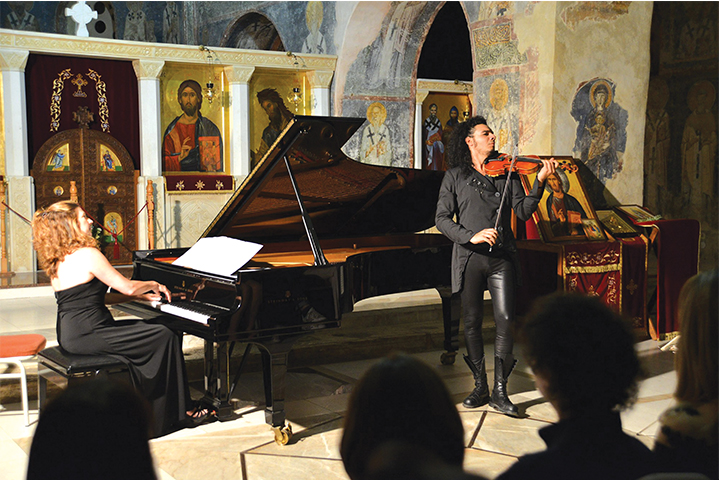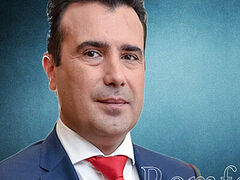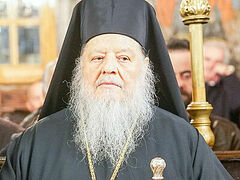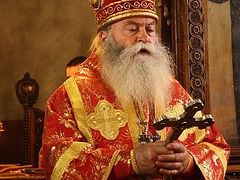 The Cathedral of St. Sophia in Ohrid, belonging to the schismatic Macedonian church, is mainly used as a concert hall
The Cathedral of St. Sophia in Ohrid, belonging to the schismatic Macedonian church, is mainly used as a concert hall
When we were robbed once in Skopje, the capital of North Macedonia, we foolishly decided to go to the police. I must say up front that it was useless in the sense of solving the crime, catching the perpetrators, compensating for damages, and so on. But we still got a lesson, and not a bad one, during those three unforgettable hours spent at the police station: a lesson in hate and stupidity. The fact is that almost our entire conversation with the Macedonian police officer was spent not clarifying the circumstances of the incident (he was clearly uninterested), but… complaining about the non-recognition of the schismatic “Macedonian Orthodox Church” by the rest of Orthodox world.
“You Russians, you’re brothers with the Serbs, aren’t you? And why don’t you recognize our Church?! Because the Serbs don’t recognize it, right?”
We were a bit taken aback by this attack, and we said that they actually have the Archdiocese of Ohrid in Macedonia, and that everyone amicably recognizes and prays with it.
“But that’s not the right Church!” the officer grimaced. “It doesn’t defend the independence of Macedonia!”
We always thought that the Church and politics were slightly different things, which is what we told him.
The officer’s answers weren’t recorded in the protocol, of course. So much malice, such stupid resentment against who knows who—we didn’t expect to hear.
“I’d rather be robbed again than listen to all this nonsense,” my friend said to me as we left the station.
“Quiet!” I said. “They might do it.”
And we laughed sadly.
Jokes are jokes, but anger and hatred caused by division and disunity are depressing, and even more so in the Church. If they even inflicted violent wounds upon such titans of spirit as the late Patriarch Pavle of Serbia, then what can be said for us?
Here is what Archimandrite Jovan (Radosavlević), a close friend and co-struggler of the late Patriarch Pavle, says about the Church schism in Macedonia in his memoirs:
The Church schism in Macedonia has continued for a long time now and has inflicted many wounds on Serbia, Macedonia, and the whole Orthodox Church. This schism was caused, and even created with the active participation of the Communist Party of Macedonia with the support of the Central Committee of the Communist Party headed by Tito in Belgrade in 1967. Tito awarded “Metropolitan” Dositheus then for “gaining a victory and organizing an independent Macedonian church.” Thus the process was completed of the Macedonian church’s self-proclaimed autocephaly—with the “blessing” of the communists, and not with the blessing of the Mother Church—the Bishops’ Council of the Serbian Orthodox Church. I was a student that year in Belgrade and I learned many of the unsightly facts of this schism.
By this illegal, non-canonical act, the Macedonian church turned into a schismatic organization that could no longer be in canonical communion with either the Serbian or any other Orthodox Church. But the schismatic Macedonian bishops, as we found out, turned for help and support to… the Vatican. From the very beginning of the schism, the Serbian Church tried to overcome it, to resolve many issues, but its attempts were unsuccessful…
In 2005, a tomos of ecclesiastical autonomy was issued, which stated, among other things: “When the Mother Church is satisfied that the dioceses on its territories that were previously under its canonical jurisdiction are spiritually mature and capable of independently managing ecclesiastical and administrative affairs, it grants them a tomos and the Church on this territory is declared autonomous or autocephalous. The tomos is given to the first hierarch of such a Church from the Mother Church.”
That’s what was done: In Niš, the Bishops’ Council of the Serbian Orthodox Church elected Metropolitan Jovan as the primate of the Holy Synod of the autonomous Archdiocese of Ohrid.
Vladyka Jovan knew what awaited him. He was soon thrown into prison by the schismatics.
Vladyka Jovan said then, “In the Church, everything must pass through the Cross and suffering—then it’s transformed into Resurrection.” He undoubtedly knew that sufferings awaited him. The schismatic “Metropolitan” Timothy and other of his “bishops” and “priests” didn’t agree with the decisions taken in Niš: Not only did they not recognize the newly installed Archbishop Jovan, but he was seized at gunpoint and thrown into prison. The church he built was also destroyed, and his parents’ house in the city of Veles was burned. The priests, monks, and nuns who remained faithful to the Serbian Orthodox Church were mocked and tormented—all this was done by the schismatic “Metropolitan” Peter, the “clergy,” and the police. Thus, Metropolitan Jovan became a passion-bearer, thanks to the schismatics.
Patriarch Pavle conveyed to us the words of one of the leaders of the schismatics, “Metropolitan” Timothy: “We’d even work with the devil if only not to work with you, Serbs, and your Serbian Church!” The Patriarch replied: “If that’s how it is with you, then go to him, work with the devil, and do your work. What more do you want from us? We have nothing in common.” These were probably Patriarch Pavle’s last words to the Macedonian schismatics. Vladyka told us about it at Annunciation Monastery.
When Patriarch Pavle reposed in the Lord, Metropolitan Jovan was at his funeral in Belgrade. He served the Liturgy and funeral with all the people. The schismatic “metropolitans” who came were forbidden to approach the Patriarch’s coffin. This schism remained a deep wound in the Patriarch’s heart, and he died with it, weeping before the Lord for those who believe it’s “better to be with satan than with the Serbian Church.”




